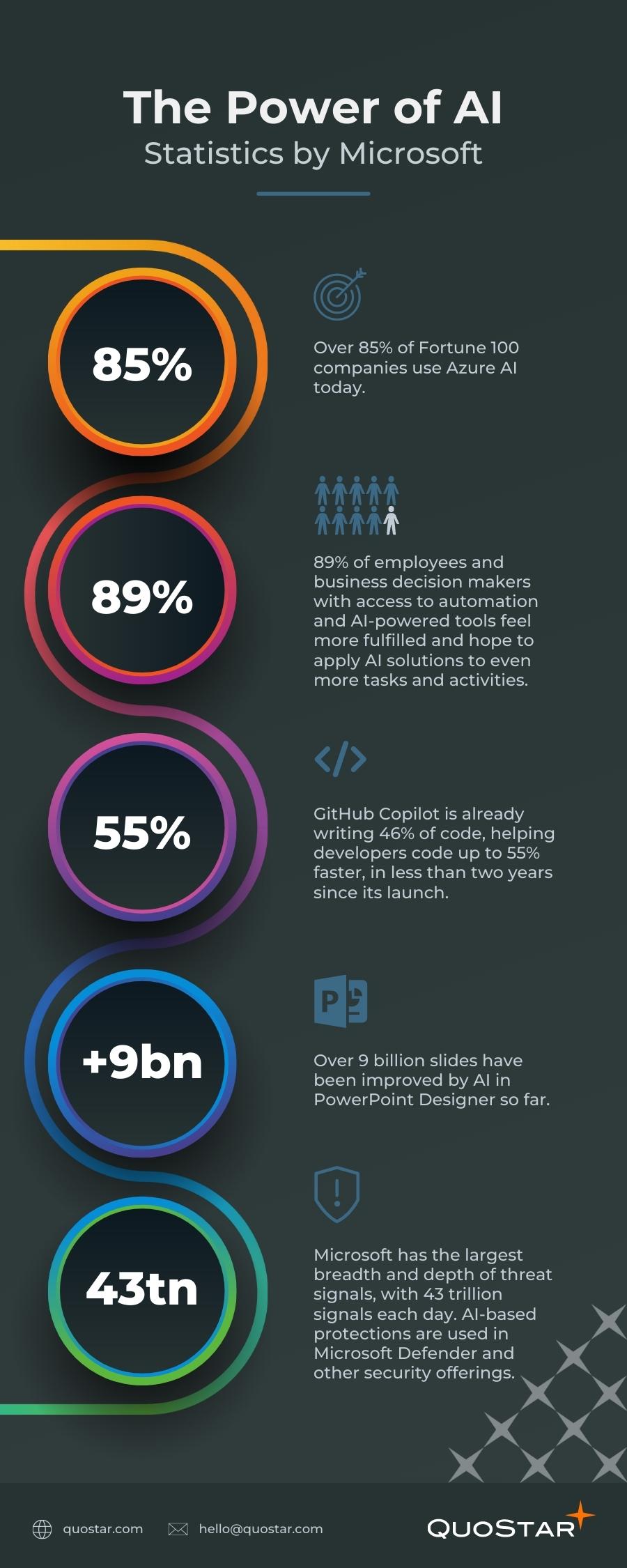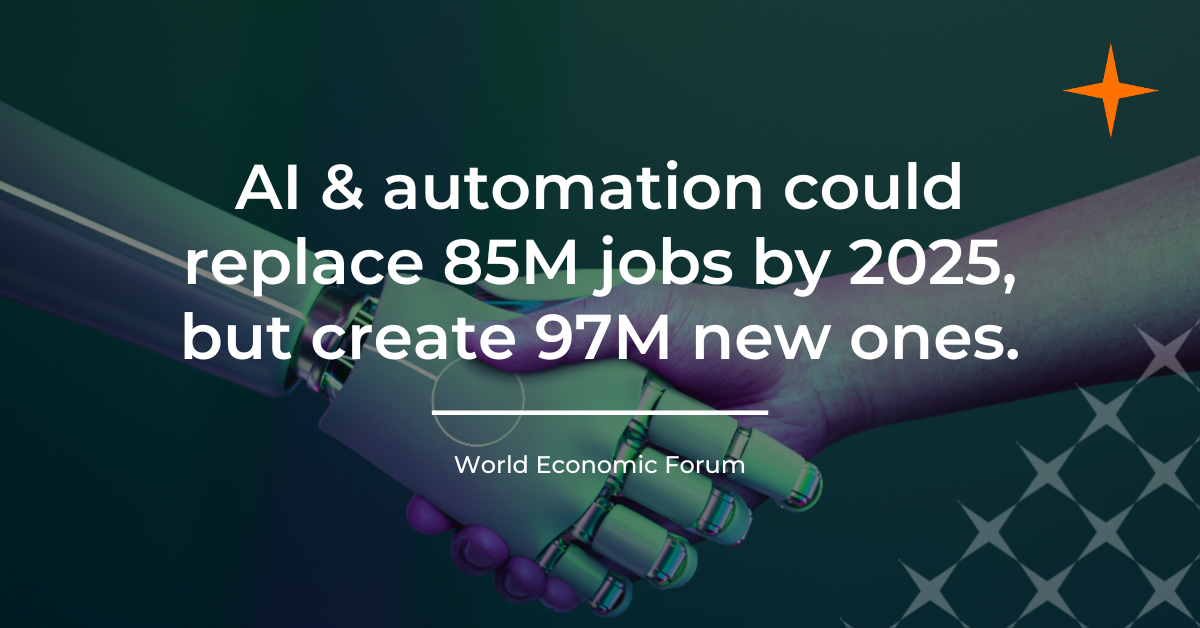Avoiding the “super-hype”
AI will be transformational, so we don’t need to debate or doubt that. However, when we look at the implications for businesses, we need to take a breather and blow a bit of the froth from the super hype around AI that is being whipped up right now. There is both fear and excitement in equal measure, and in many cases, both are unfounded. This is just distracting for businesses as they plan for the future. My contention is that by thinking clearly and taking good advice, businesses can avoid expensive mistakes and find value in practical and relevant applications of AI today.
We hear a lot about the societal and political implications of AI replacing some or even all white-collar work in future. While this makes for interesting and provocative reading, I want to focus on what business leaders should be thinking about today.
We are still in the very early days of this AI wave, and that creates hype. The news sites want content that is sensational, and the consulting firms want you to pay for consulting projects to alleviate the fear they create. You’ll notice that many blogs, articles, and IT talks use words like “could” and “should” rather than “does” and “will.” You also frequently hear “expected,” “projected,” and “forecasted” from consulting firms.
We are in “super-hype” territory, similar where we were with Cloud 15+ years ago. Was cloud transformational? Yes, it was, completely – the world got smaller, markets grew, and all of us got access to the technologies previously reserved for the global giants. We got this for a small fee per user plus a lot more. It took time for that value to filter through though, and for markets and technologies to mature. I expect AI to mature faster, and the potential impact to be broader but for most of us, the same principles will apply over the next couple of years.
We are seeing a lot of hype right now, particularly around ChatGPT and Copilot. Is ChatGPT delivering huge value to the masses really? Is Microsoft Copilot going to give you a real competitive advantage right now? They are very useful tools for sure but not earth-shattering yet. The whole arena is still immature.
Unless you are a very large business, a corporate giant, a specific niche player or perhaps a research organisation, I’d say your requirements will be met naturally by the market. It’s happening now, and you will not miss the boat if you think this through carefully and take advice from trusted and qualified technology partners.
Value from AI today
Although in their early stages, there is value to be had today from practical applications of AI, largely at the Machine Learning end of the spectrum. Many software and platform vendors are building and buying AI technologies to enhance their offerings already, and some have done so for several years. We are seeing steady developments in most business systems, and here are a few examples:
- Cybersecurity: With cyber threats becoming more sophisticated, mid-sized businesses are adopting AI-powered cybersecurity solutions like SentinelOne and MS Defender, which use machine learning to detect and respond to security threats more efficiently than traditional antivirus products. AI can also help businesses with data protection, compliance, and incident response.
- Customer Relationship Management (CRM): Businesses are using AI-enhanced CRM platforms like Salesforce or HubSpot to streamline their sales processes and improve their customer service. These platforms can leverage AI to predict customer behaviour, personalise communication, and automate responses, leading to more efficient sales cycles and higher customer satisfaction.
- Accounting: AI tools are being used to automate bookkeeping and financial analysis. For instance, many accounting platforms use AI to categorise expenses and make tax recommendations. AI can also help businesses with cash flow forecasting, fraud detection, and risk assessments.
- Human Resources and Recruitment: HR tools with AI-enhancement assist in automating payroll, benefits administration, and recruitment processes. AI algorithms can screen resumes, schedule interviews and even predict candidate fit and thereby make hiring process faster and more effective. AI can also help businesses with employee engagement, retention, and development to foster a positive and productive working culture.
- Inventory Management and Supply Chain Optimisation: Mid-sized retail and manufacturing businesses utilise AI for inventory forecasting and supply chain optimisation. Tools like NetSuite or SAP Business One employ AI to analyse sales data and predict inventory needs to reduce overstock and stockouts. AI can also help with demand planning, logistics, and quality control, improving operational efficiency and client satisfaction.
- Marketing and Customer Insights: AI within products, such as Marketo and Pardot help businesses analyse customer data, predict market trends, personalise marketing campaigns and ultimately increase engagement and conversion. AI can also help businesses to create content, manage social media and web analytics to enhance brand awareness and reputation.
- Predictive Maintenance in Manufacturing: Companies are implementing AI for predictive maintenance in manufacturing; using sensors and data analytics to monitor the condition and performance of machines and equipment, predicting and even preventing failures. Tools like IBM Maximo or Microsoft Azure IoT use AI to optimise maintenance schedules, reduce downtime, and extend equipment life, thereby saving costs and improving quality.
Get the right guidance
I hope I have shown that AI is delivering practical and relevant value now for organisations that know how to make use of it. The market is delivering the functionality and evolving it continually. That does, of course, mean that businesses should keep their eyes open and watch their markets.
AI will arrive through the sales engines of technology vendors. And this is where most care is needed: to avoid being swept up by the hype of a new technology, buying vapourware and undertaking projects that will never realise the sold visions and dreams.
Most importantly, this all means that every business needs access to sound advice from partners who live these technologies daily and whom they can trust to provide practical guidance rather than speculation. I always recommend appropriate research, evaluation and piloting to build awareness and familiarity. There is value to be had for sure, but we do need to calm some of the hysteria.
Microsoft’s premier annual event, Microsoft Inspire 2023, recently concluded, providing industry leaders and partners alike with a glimpse of Microsoft’s vision for the future. There’s no doubt that Microsoft wants to empower individuals worldwide to work in a new AI-driven way, expanding the scope of AI technology to help everyone in various aspects of their roles. In this recap blog, we’ll highlight some of the key takeaways from the event and how it sets the stage for a secure and AI-driven business landscape.
Advancing AI ambitions
Regardless of your feelings about AI technology, it’s hard to ignore the platform change that Satya Nadella (Chairman and CEO at Microsoft) laid out in the keynote speech. The next big shift in our way of working is here – using natural language as our interface with technology, facilitated by AI.
The event marked the launch of two groundbreaking AI-driven solutions, Bing Chat Enterprise and Microsoft 365 Copilot, promising to redefine how we work, delivering increased efficiency for business advantage through AI-driven insights and automation.
During the event, Microsoft detailed the functionalities and pricing of these new tools:
- Bing Chat Enterprise: Think of it as Google on steroids, working with both public and private data while maintaining appropriate data governance to ensure your IP is not leaked. Currently available in preview, we expect this to roll out in late 2023 or early 2024 for Microsoft 365 E3, E5, Business Standard, and Business Premium users at no additional cost. For those rare clients without some form of M365 licensing, the standalone offering will be available for $5 per user per month.
- Microsoft 365 Copilot: While Bing Chat Enterprise will reference business data and aid you in your day-to-day tasks, Copilot takes it to the next stage of evolution It offers integrated AI that can work with and for you in your native applications, through a natural language interface. Hand off those menial tasks and focus on the exciting stuff. Microsoft has initially released Sales Copilot, with the promise of wider integration to come and we finally know how much it will cost. $30 per user per month for Microsoft 365 E3, E5, Business Standard, and Business Premium clients. While it may feel expensive for some, how and who you deploy it for will be key.
- New AI capabilities across Microsoft 365: AI is coming to the rest of the M365 suite, enhancing productivity and engagement with features like Copilot in Teams Phone and Chat, Microsoft Viva updates, Windows 365 Frontline, Microsoft 365 Backup, and Microsoft 365 Archive.
To learn more, read the blog post by Colette Stallbaumer, General Manager, Microsoft 365 and Future of Work here.
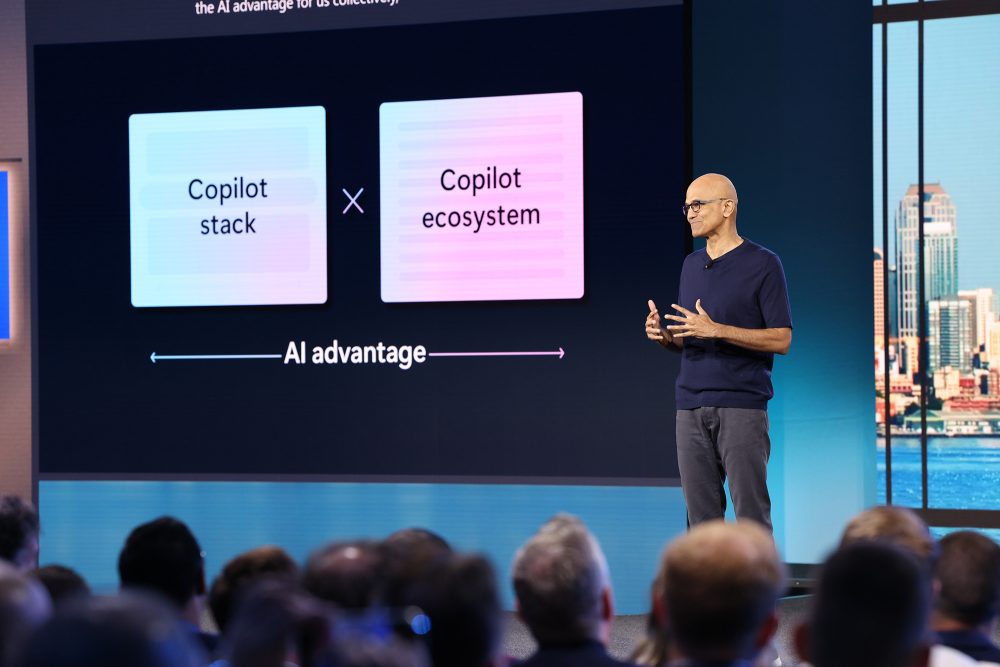
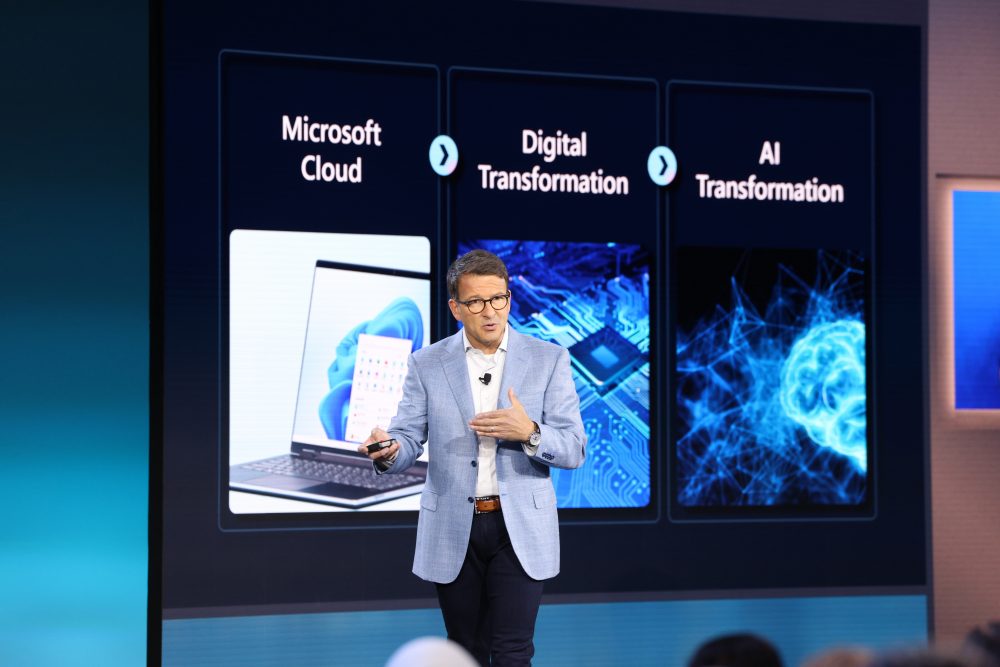
Embracing the future of security with AI
Emerging technologies are rapidly evolving, and cybersecurity has become more crucial than ever before. Microsoft Inspire cast a spotlight on the future of security powered by AI, highlighting the unique opportunity to harness AI’s power alongside an end-to-end security solution for building a resilient security posture with rapidly adaptable defences.
Based on Microsoft’s internal data, cyber-attacks are rapidly adopting automation through AI-assisted tools. The number of password attacks detected by Microsoft has surged significantly, growing over threefold in the past year, from 1,287 per second to more than 4,000 per second. As a result, the cost of cyberattacks is continuously rising. If organisations stick to outdated security measures and only rely on past strategies, they may leave vulnerabilities in their security posture.
Partners and clients were introduced to valuable resources to strengthen their defences against ever-changing threats. They showed how using AI can help to spot and stop potential risks before they become a problem. They also emphasised the importance of safeguarding critical data and customer information. Throughout the event, it was clear that Microsoft is dedicated to empowering businesses with smart security solutions.
For the full details, read the announcement here to learn more.
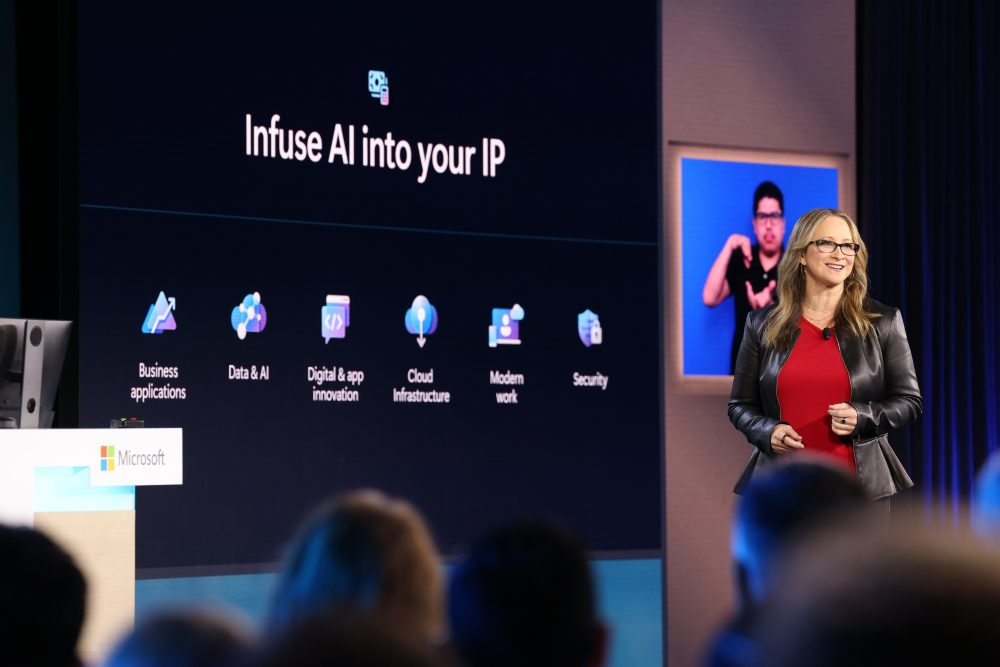
Conclusion
Microsoft Inspire 2023 revealed a series of key announcements and technologies, showcasing the tech giant’s dedication to AI advancements and comprehensive security solutions. From fortified cybersecurity measures to innovative AI tools elevating collaboration and productivity, Microsoft is continuously pushing the boundaries in the tech space.
As the digital landscape continues to evolve, embracing these transformative technologies becomes crucial for achieving business success in today’s competitive environment. Sure, these technologies can be exciting, but we get it – they can also feel overwhelming, and you don’t have to navigate it alone.
Artificial intelligence (AI) is the buzzword of the moment. It’s hard to browse any tech-related news site without seeing the latest development, product or service related to AI. But how is AI really impacting the tech industry?
The Rise of AI-Powered Products and Services
One of the biggest impacts of AI on the tech industry is the rise of AI-powered products and services. From digital assistants like Siri and Alexa to machine learning algorithms that can predict your shopping habits, AI is everywhere. Microsoft 365 Copilot is a great example that showcases the immense potential of AI to enhance user experience and increase efficiency. By using the power of large language models (LLMs) and integrating it with source data across all Microsoft 365 apps and services, Copilot promises to transform the way individuals engage with their tasks by turning user input into a powerful productivity tool.
Other tech giants like Google, Amazon, and Facebook are also investing heavily in AI-powered products and services. Google has made significant advancements in natural language processing, while Amazon is using AI to improve its supply chain management. Facebook, as another example, is using AI to improve its content moderation capabilities.
The Future of Work and the Role of AI
AI is going to have a significant impact on the future of the workplace, not just how we work and interact but how we leverage technology to coordinate, plan and accomplish our goals. Whilst AI isn’t going to take your job, perhaps the user that harnesses it more effectively will.
The World Economic Forum has estimated that by 2025, AI and automation could replace 85 million jobs, whilst also creating 97 million new ones. It feels inevitable jobs will be replaced by AI-powered services over time and the nature of remaining jobs will change, and in turn new jobs will be created.
We expect there will be shifts similar to the changes seen with other major technological advances such as the invention of the printing press, telephone or the internet. Shifts which will require new ways of thinking about skills and training to ensure users are prepared for the future and that there is enough talent available for critical jobs. As AI becomes more prevalent, companies need to adapt by investing and deploying new technologies effectively, retraining their employees, and creating new roles to work alongside AI.
Responsible AI
While AI has many potential benefits, there are also ethical considerations to consider.
Implementing a responsible AI strategy is a challenge many organisations struggle with – ensuring that AI models do not perpetuate biases or discrimination based on race, gender, age, or any other protected characteristic is a key consideration.
AI relies on vast amounts of data and it’s essential that this data is kept secure and private. It’s particularly important that businesses prioritise data privacy and security, ensuring that user data is protected and used responsibly in compliance with relevant regulations and laws.
Businesses should also consider the potential implication of replacing human workers with machines. While some jobs may be lost to AI, new jobs will also be created. However, it’s important to consider the social and economic impacts of this transition.
Statistics
It’s clear that AI is already making a profound impact on the tech industry. As an example, ChatGPT gained a million users in just five days after its launch in November 2022, as reported by OpenAI. This app has now become the fastest-growing app in history, with over 100 million users estimated to be using it. The recent data from Similarweb also reveals that chat.openai.com has received approximately one billion visits in the last 30 days, highlighting a significant interest in AI-powered communication. It is worth noting that the effectiveness of AI-powered tools largely depends on the quality of the data inputted; accurate and timely business data is crucial for achieving the best results.
Conclusion
AI is rapidly changing the way we work and interact with technology, and its impact is being felt in every aspect of our lives. The proliferation of AI-powered products and services is just one example of this transformation, and as users, we are embracing these new technologies at an unprecedented pace. While AI cannot do everything for us, it can undoubtedly improve task efficiency and effectiveness. As an example, ChatGPT was responsible for proofreading and copywriting most of this article.
As AI continues to evolve, it’s important for companies to stay ahead of the curve, invest, and adapt to the changing landscape. At QuoStar, we understand the importance of keeping up with the latest technological advancements, and we are committed to sharing insights and helping our clients leverage these technologies to achieve their business goals.
